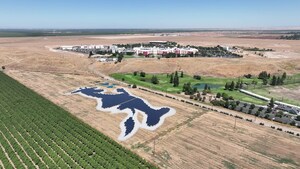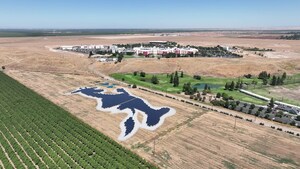Valley Children's Hospital First in U.S. to Use Advanced Genetic Testing to Save Babies' Hearing
MADERA, Calif., June 25, 2024 /PRNewswire/ -- What if a gentle swab of an infant's cheek was all it took to know if giving them a common antibiotic could also lead to long-term hearing loss?
That is what Valley Children's Precision Medicine Program is doing: the team is the first in the nation to use a revolutionary genetic test that can quickly let a doctor know if their tiny patient is at higher risk of hearing damage from a type of antibiotic known as an aminoglycoside. Once a doctor knows that the baby has a particular version of a key hearing gene, they can then choose a different course of care to treat an infection.
"Genes are like the individual instructions in a book that tell the body how to build and work, so understanding them is important in creating a treatment plan for each patient," said Dr. Jeremy Woods, Valley Children's geneticist and director of the Precision Medicine Program.
Aminoglycosides are a class of antibiotics often used to treat infections for infants in the neonatal intensive care unit (NICU). But in addition to attacking bacteria, the medicines can also attack human proteins that are vital to hearing development. That's not usually a problem, but for babies born with certain variants of the MT-RNR1 gene, the risk for aminoglycoside-induced hearing loss (AIHL) is much greater. Insights suggest that this could be the explanation for at least 1% of hearing loss that occurs in children before language development, and likely more.
The problem until now was being able to check the baby's genetic "map" quickly if they got sick. Valley Children's has solved that with a simple, non-invasive test. A small saliva sample from the baby's cheek is then analyzed by a special machine that tests for changes in the MT-RNR1 gene. The machine is no larger than an inkjet printer and can deliver results to physicians in under an hour when time is of the essence. Valley Children's Precision Medicine team is conducting MT-RNR1 rapid testing for patients outside of the hospital, with plans to standardize this process for babies in the hospital later this year.
"Previously, we would have to wait weeks for the results of MT-RNR1 genetic testing. Now, we can have results back in under an hour," Dr. Woods said. "That gives us plenty of time to choose a safer antibiotic to treat a seriously ill baby."
This life-changing advancement is one of several innovative tools pioneered by Valley Children's Precision Medicine Program. Earlier this year, the hospital began using an advanced genetic testing module as part of the electronic patient information system. This system allows providers to effortlessly order a comprehensive genetic test (whole genome sequencing) that includes one or both parents and provides instant care recommendations based on a child's specific genetic map.
Valley Children's was also one of only five institutions to participate in a Medi-Cal pilot program called Project Baby Bear, which used rapid whole genome sequencing to improve the care for critically ill infants with undiagnosed illnesses.
"Standardizing genome testing in the NICU underscores our commitment to utilizing cutting-edge technology and genetics to provide our patients with more than the best care, but the specialized kind of care they need," Dr. Woods said.
About Valley Children's Healthcare
Valley Children's Healthcare provides Central California's only high-quality, comprehensive care exclusively for children, from before birth to young adulthood. Our network offers highly specialized medical and surgical services to care for children with conditions ranging from common to the highly complex at its 358-bed stand-alone children's hospital that includes 28 NICU beds at partner hospitals. In addition, the Valley Children's Healthcare network includes specialty care centers, pediatric primary care practices and women's health services.
Our family-centered, pediatric services extend from a leading pediatric cancer and blood diseases center on the West Coast, and a pediatric heart center known for its expertise and pioneering treatments, to an 88-bed Regional Level IV neonatal intensive care unit (NICU), the highest-level referral center between Los Angeles and the Bay Area.
Valley Children's was the first children's hospital west of the Rockies to receive Magnet Nursing designation, the highest nursing benchmark in the world. In 2023, U.S. News and World Report again named Valley Children's one of the best children's hospitals in the country in seven pediatric specialties. With more than 670 physicians and 3,500 staff, Valley Children's delivers high-quality, comprehensive care to more than 1.3 million children from Kern County to the state capital and from the Central Coast to the Sierra. For more information, please visit www.valleychildrens.org
SOURCE Valley Children's Healthcare

WANT YOUR COMPANY'S NEWS FEATURED ON PRNEWSWIRE.COM?
Newsrooms &
Influencers
Digital Media
Outlets
Journalists
Opted In




Share this article